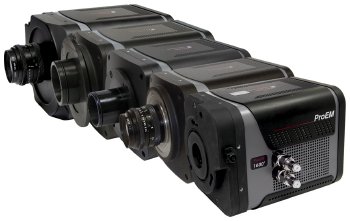Princeton Instruments (Trenton, New Jersey, USA) is pleased to announce the launch of its ProEM+ series of professional-grade EMCCD cameras for scientific imaging and spectroscopy applications. These next-generation cameras deliver the unprecedented sensitivity, temporal resolution, and quantitative stability required for very low light applications.
 ProEM+ series of professional-grade EMCCD cameras for scientific imaging and spectroscopy applications from Princeton Instruments.
ProEM+ series of professional-grade EMCCD cameras for scientific imaging and spectroscopy applications from Princeton Instruments.
ProEM+ cameras are available in four different pixel formats: 512 x 512 or 1024 x 1024 for imaging, and 1600 x 200 or 1600 x 400 for spectroscopy. The new cameras provide ~95% peak quantum efficiency as well as single-photon sensitivity via built-in EM gain functionality. Concurrent with the release of ProEM+ cameras, Princeton Instruments is also releasing eXcelon™3, an exclusive EMCCD technology that offers a broader sensitivity range along with reduced etaloning for unparalleled performance.
To afford researchers the ultimate in ease of use, all ProEM+ cameras are fully supported by Princeton Instruments’ LightField™ 64-bit image acquisition software. Additionally, a new high-speed operation mode allows the cameras to run at >10,000 fps with reduced ROI and binning. ProEM+ cameras can also be operated in kinetics mode for microsecond time resolution.
“Since their introduction in 2009, ProEM cameras have quickly become the reference standard in the scientific EMCCD market in terms of both versatility and performance,” says Ravi Guntupalli, vice president of sales and marketing at Princeton Instruments. “Based on the continuous stream of positive feedback we’re receiving from our customers, the newly designed ProEM+ is simply the best EMCCD camera available for low-light imaging and spectroscopy!”
New ProEM+ cameras offer several novel features, such as OptiCAL for precise EM gain calibration using a built-in stable light source, the lowest read noise on the market, detector cooling to below -90°C, an all-metal sealed design backed by a permanent-vacuum guarantee, and a Gigabit Ethernet (GigE) interface that ensures fast data throughput. Furthermore, the availability of 100 kHz ‘non-EM mode’ operation means the new cameras can also be used for steady-state applications with read noise as low as 2 e- rms. Princeton Instruments’ new eXcelon3 sensor technology further extends the impressive utility of ProEM+ cameras for time-resolved, low-light applications.